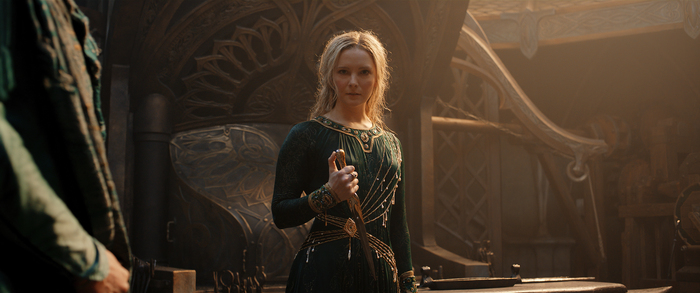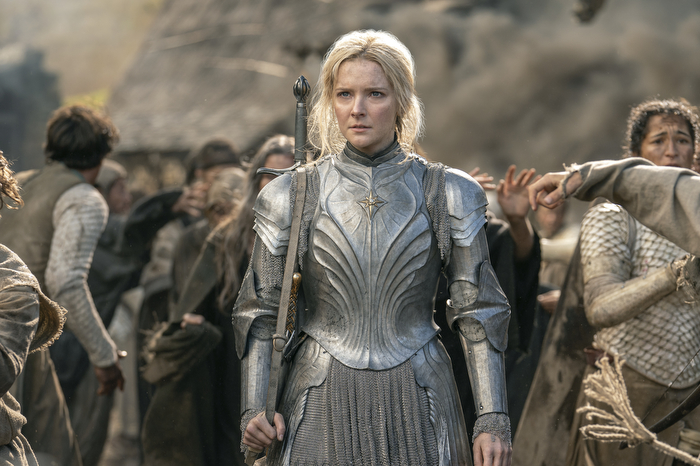
Galadriel in Rings of Power: one joke to rule them all
Olivia Hupfauer, Managing Editor
It’s ironic to me, that modern media is so intent on diversity being the most important feature of its production, yet everything it produces is nothing of the sort; save appearances.
All variety of characters, young, old, male, female, princess, orphan, heroes and even villains are all being crammed into one cookie cutter character format: the strong, independent warrior who automatically good at everything and doesn’t struggle with anything. Unfortunately, this has been an increasing pattern with modern female characters. Disney’s live action Mulan, Prime Video’s Cinderella, Star Wars’ Rey Palpatine/Skywalker, Marvel’s She-Hulk, The Witcher’s (Netflix) Yennefer and now Rings of Power’s Galadriel.
The destruction of her character, brought about by previously unknown and extremely inexperienced writers JD Payne and Patrick McKay, is an example of a growing threat to the diverse characterization of womanhood.
Galadriel originally is a figure of wisdom; she showcased a form of womanhood that is often overlooked in media. She is strong because of her elegance, grace and age. She carries thousands and thousands of years of knowledge and experience. She is a powerful magician, a skilled leader and has a gentle spirit. Rings of Power’s Galadriel is a brute, immature, brash and selfish child. She is careless, vengeful and evil. She threatens to commit genocide against another race and looks as if she enjoys the thought of mass murder.
And these violent or reckless actions are rewarded constantly in the show. She jumps ship into a sea monster infested ocean thousands of miles away from land and coincidentally runs into someone she’s been relentlessly pursuing all across Middle Earth – for thousands of years. She marches up into Númenor, a foreign land, like she owns the place and arrogantly and consistently insults the Queen, her military commanders, leaders, and the rest of the citizens of Númenor. Yet a few episodes later the Queen submissively obeys Galadriel, and even entrusts an army of Númenoreans into her care to sail to middle earth (that is thousands of miles away mind you) and pursue a threat that is only supported by hearsay.

Many of the female characters that are being destroyed by these re-imaginations in modern media were, ironically, already strong in their own way. Mulan (1990) wielded a sword because she had to – she was pretending to be a man. But ultimately, she saves her country embracing her feminine traits and using them to an advantage.
Yennefer in the Witcher books has a fiery spirit –she is a magician whose strong character and magical intellect remains unmatched by any other sorceress. If you cross her, you’ll regret it. But she has a kind spirit underneath her tough skin, and she’ll fight to the death for those she loves. She would never put them in danger as her TV series counterpart does. What has been done to Galadriel’s character is no different.
Some would argue that there is nothing wrong with giving her a sword and a suit of armor – it actually stays true to her original character, and in a sense that would be correct. It has been mentioned that Galadriel was involved in wars and fighting in the first age; though her early life is confusing since there are conflicting accounts in Tolkien’s LOTR prequels, the Unfinished Tales, and The Silmarillion. But being a soldier and warrior is not the main part of her character, nor even anything really special.
All elves, male and female, in Tolkien’s lore are valiant fighters and skilled swordsmen. You would be, too, if you were thousands of years old. Giving Galadriel a sword is not the problem – taking away her wisdom and docile spirit is. Her character is multi-dimensional. She didn’t need a sword in her hand constantly to portray her as someone who shouldn’t be messed with and her real power comes from abilities greater than just wielding a sword and donning a shield. She is a powerful magician, wise beyond comparison and older than the sun and moon of Arda. Galadriel’s weapon is her mind. Her words, demeanor and disposition are her strengths.
Some might also argue that the Rings of Power Galadriel doesn’t act like Peter Jackson’s Galadriel because there are thousands of years that separate them. ROP Galadriel is younger, so it makes sense for her to act childishly and rash. I disagree. Although Galadriel is one of the youngest of the oldest elves in Arda, she is never once described as reckless or careless. In fact, it’s the opposite. Tolkiengateway.net quotes a description of Galadriel from Tolkien’s book, The Peoples of Middle Earth: “[Galadriel] a match for both the loremasters and the athletes of the Eldar in the days of their youth.”
“Well for the sake of character development.” some would claim, saying Galadriel needed growth and things to overcome for the story to be interesting. I agree. But do it for another character, create something original and new for audiences to experience. Galadriel already has a well written character arc in Tolkien’s writings. In Valinor she desired nothing more than a kingdom of her own to rule over. She desired power.
So, she traveled to Middle Earth to feed this desire. There she and her husband Celeborn led many elven communities and eventually became ruler over their own kingdom, Lothlórien, the place Frodo and the fellowship visit in Fellowship of the Ring. This could have been further explored and would have been the right thing to do for Rings of Power (and Galadriel) as an adaptation and a representation of a strong woman. Galadriel’s climactic character moment occurs in Fellowship of the Ring when Frodo offers her the One Ring; and she narrates for us what that would mean for her:
“And now at last it comes. You will give me the Ring freely! In place of the Dark Lord you will set up a Queen. And I shall not be dark, but beautiful and terrible as the Morning and the Night! Fair as the Sea and the Sun and the Snow upon the Mountain! Dreadful as the Storm and the Lightning! Stronger than the foundations of the earth. All shall love me and despair!”
The Fellowship of the Ring, Book II Chapter 7
Yet she refuses to take the ring. Galadriel, who has sought power for centuries, refuses the only form of pure, ultimate power anyone has ever encountered – and it was offered freely. If that doesn’t scream character development, I don’t know what does. Rings of Power had a perfectly good opportunity to flesh out this part of her character. Of course there is still time to do this, but the damage that has been done is irreversable, and the Galadriel of Rings of Power is just Galadriel in name; she is not the real Galadriel.
Payne and McKay, like so many writers of female characters in modern media, disregard the complexity of female characters and turn them into a one-dimensional, second-rate characters – all in the name of “empowering women”.
As a woman, I plead with Hollywood and these so called “writers” to end this war on womanhood. I do not feel empowered by these new characters, I feel mocked. None of the recent modern women are empowering, and if you have to constantly remind your audience of how awesome your female character is, you have missed several of the marks. The butchering of Galadriel in Rings of Power is a tragedy to her character, Tolkien’s story, and a slap in the face to womanhood.
Feature photo courtesy of Prime Video
